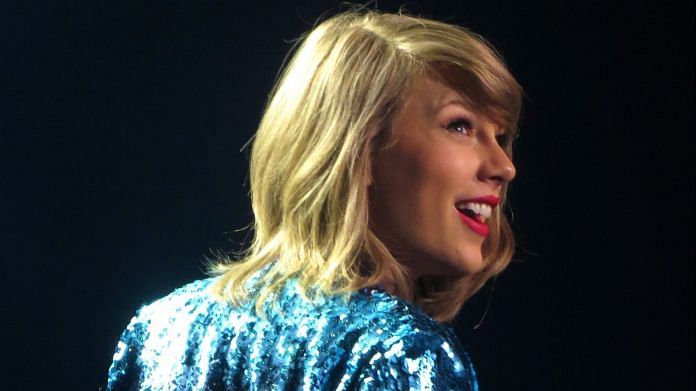The news media have squeezed lots of headlines out of the fact that during an oral argument at the U.S. Supreme Court earlier this week, three justices mentioned Taylor Swift. But click-bait aside, the religious freedom case that gave rise to Tuesday’s colloquy is an important one, the outcome of which might hint at a path toward compromise on the difficult issue of qualified immunity.
As a formal matter, the case of Uzuegbunam v. Preczewski doesn’t have anything to do with that controversial doctrine. The suit was filed by students who claimed that their college violated the First Amendment by trying to prevent them from speaking to others about their religious beliefs. After the suit was filed, the school changed its policy. The lower courts held that the new rules rendered the case moot. Before the Supreme Court, the students insist that that their suit should go forward to vindicate their constitutional rights, even if they can win only nominal damages.
The case also doesn’t actually involve Taylor Swift. But Justices Elena Kagan, Amy Coney Barrett and Neil Gorsuch all brought up the singer’s 2017 sexual assault lawsuit against a radio host she accused of groping her. And the relevance is clear: Swift sought only one dollar in damages. She wasn’t after money. She sought vindication of her claim.
Judicial hostility to claims for nominal damages has a long pedigree. Tort law, for example, has a strong tradition that a plaintiff unable to show harm should receive no relief. That most well-worn of legal maxims — de minimis non curat lex — was intended not merely to shield judges from lawsuits that might waste their time, but also to control unscrupulous lawyers who might otherwise charge clients hefty fees for pressing meaningless claims.
Yet the courts over the years have charted any number of paths for plaintiffs whose damages are small. For instance, the courts still quote the language of a 1765 British case about trespass which held that “when one man placed his foot on another’s property, the property owner needed to show nothing more.”
Moreover, nominal damages have long been crucial in vindicating reputation. Before Taylor Swift’s case, the best-known example arose in 1913, when Theodore Roosevelt sued the editor of an Ishpeming, Michigan, newspaper for writing in an editorial that the former president “gets drunk, not infrequently.” At the trial, Roosevelt called one witness after another who testified to his temperate habits. Finally, the editor conceded that he had the facts wrong. Roosevelt immediately dropped his claim for damages, requesting instead that the jury award him only six cents — a request with which the jurors promptly complied.
Roosevelt, like Swift, was less interested in taking the defendant’s money than in obtaining a judicial finding that backed him up. And in recent years, an increasing number of courts facing suits for constitutional violations have held that the fact that only nominal damages are sought doesn’t mean the case must be dismissed.
Which brings us to qualified immunity.
Qualified immunity is a court-created doctrine that protects public employees from having to pay large damages in situations where they didn’t know their conduct would lead to personal liability. In recent years, it has most often arisen in discussions of police brutality. As I’ve written often in this space, I’m no fan of qualified immunity, whether deployed for the benefit of law enforcement officers or other government officials. But while I’d prefer to see the doctrine abolished, nominal damages might offer a temporary compromise.
Lawyers have complained for years that when a lawsuit is dismissed on qualified immunity grounds, the court often doesn’t bother setting forth a rule of law to govern future conduct. Thus neither future plaintiffs nor future officials know what’s allowed and what isn’t. But nominal damages — so scholars have argued — would allow a judge to adjudicate the rights at stake without risk of a large judgment against the defendants.
The approach isn’t new. Federal judges have adopted it when interpreting other statutes. Consider the Prison Litigation Reform Act of 1996, which bars inmates who sue for mistreatment during confinement from recovering damages “for mental or emotional injury suffered while in custody without a prior showing of physical injury.” Despite this clear language, several federal courts have held that prisoners whose claims might seem barred by this exception may still receive nominal damages in order to vindicate their rights to proper treatment. This at least puts prison officials on notice so that next time they can’t claim ignorance of the rules.
Similarly, if qualified immunity were to be construed to allow courts to award nominal damages, the next police officer or mayor accused of doing the same thing would be unable to hide behind the shield.
That’s why I hope the Supreme Court rules for the plaintiffs in Uzuegbunam v. Preczewski. As it happens, I think the students are correct in their religious freedom claim. But even if I didn’t, I would argue that the justices should let their seemingly moot claim go forward despite the fact that they seek only nominal damages. Such a ruling would have the salutary effect of encouraging other courts to do what the doctrine of qualified immunity often leads them not to: setting out clear rules so that government officials in later cases can’t claim ignorance. – Bloomberg
Also read: Taylor Swift calls out Trump for stoking ‘fires of white supremacy’ over Minneapolis protests



